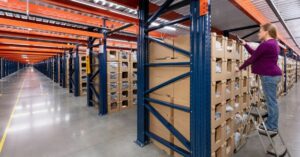E-commerce is a multi-faceted industry that requires a place to store, package, and ship inventory. A business owner first starting in the e-commerce space might rely on their home office or garage as a makeshift setup to fulfill online orders. While this hands-on approach works initially, it often becomes unsustainable as the business grows and order volumes increase. That’s where fulfillment centers come in.
If you’re new to the concept, this blog will dive into the details of what a fulfillment center is, how it works, and why it’s a game-changer for growing e-commerce businesses. Whether you’re a startup or a scaling enterprise, understanding fulfillment centers can help you make informed decisions about your logistics strategy.

What Is A Fulfillment Center?
A fulfillment center is a facility where orders are fulfilled and is typically operated by a third-party logistics (3PL) provider. These centers are designed to manage the logistics of inventory storage, packaging, and shipping, ensuring that client orders are processed and delivered efficiently. Fulfillment centers are critical components of the supply chain, whether they serve e-commerce enterprises selling directly to consumers or business-to-retail fulfillment for wholesale orders.
Fulfillment Centers Vs. Warehouses
While fulfillment centers and warehouses are both huge buildings that store products for businesses, their functions in the logistics and supply chain processes are very different. Individual corporations often own or rent warehouses, which are used largely for long-term product storage. Their major job is to store merchandise until it is needed, making them suitable for organizations that deal with slow-moving or seasonal inventory.
Fulfillment centers, on the other hand, operate on a larger scale and offer comprehensive services that go beyond mere storage. These facilities, which are frequently handled by third-party logistics (3PL) companies, handle inventory storage, order processing, packaging, and shipping. They serve e-commerce enterprises that sell directly to customers, as well as wholesale operations that supply major retailers.
The distinction is in their purpose: warehouses hold goods, whereas fulfillment centers are dedicated to the fast-paced, dynamic process of delivering products directly to customers or retailers. Understanding these differences might assist firms in selecting the best option to fulfill their specific logistics requirements.

Benefits of Fulfillment Centers
- Streamlined Operations
- Fulfillment centers handle supply chain operations, freeing up your time and resources to focus on business growth activities like marketing, accounting, and product development.
- Flexibility During Sales Seasons
- Scale operations effortlessly during peak seasons and optimize costs during slower periods, thanks to the adaptability fulfillment centers provide.
- Cost-Effective Shipping
- Leverage robust logistics networks to reduce shipping costs and deliver products quickly and efficiently to customers.
- Reliable Inventory Management
- Fulfillment centers provide real-time tracking of stock levels, ensuring accurate sales forecasts, timely replenishment orders, and fewer out-of-stock issues.
- Consistent Pick, Pack, and Ship Process
- Maintain high-quality fulfillment with a consistent system for picking, packing, and shipping orders, customized to your brand’s specifications.
- Omnichannel Integration
- Connect all your sales channels—storefronts, marketplaces, and more—under one platform for seamless fulfillment across all platforms.
- Specialized Packaging Options
- Fulfillment centers can handle unique requirements like kitting, bundling, or special packaging to meet your specific business needs.
- Bulk and Individual Order Handling
- Whether shipping individual consumer orders or bulk orders to retailers, fulfillment centers ensure accuracy and on-time delivery every time.
- Improved Customer Satisfaction
- With accurate inventory tracking, timely shipments, and brand-specific packaging, fulfillment centers help you meet and exceed customer expectations.
A fulfillment center is more than just a logistics solution; it’s a partner that enables businesses to grow, adapt, and thrive in a competitive marketplace.

Why Work with Unilogic?
Amazon may be a popular option for fulfillment, but it’s not the only choice—nor is it always the best one. At Unilogic, we offer a modern solution tailored to the needs of today’s fast-paced industry, providing businesses with a full suite of services, including storage, inventory management, pick and pack, shipping, and more.
Partnering with Unilogic means you can handle time-consuming tasks like fulfillment, inventory organization, and final delivery without the burden of excessive fees. Our streamlined operations allow you to save on costs and focus on growth-driving activities such as product innovation, marketing, and expanding your brand.
One of the biggest challenges businesses face is a lack of physical space or infrastructure to manage inventory effectively. That’s where Unilogic comes in. We offer a dependable, scalable fulfillment solution where sellers can send their merchandise for expert handling. From managing inventory and providing ancillary warehouse services to shipping goods directly to Amazon Warehouses or your customers, Unilogic ensures a seamless and cost-effective process.
With Unilogic, you gain a partner that is focused on your success, offering flexibility, transparency, and a high level of service that puts you in control of your logistics strategy. Choose Unilogic for a fulfillment solution that’s tailored to your needs—because modern businesses deserve modern solutions.

